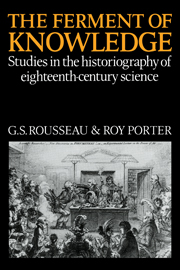3 - Social uses of science
Published online by Cambridge University Press: 03 May 2010
Summary
Introduction
Representations of nature in scientific culture have been widely used to comment upon the social order. Such social uses have not, however, greatly interested historians of science. They routinely consider their business to be the study of the generation and evaluation of scientific knowledge. Social uses of scientific knowledge are conceived to occur in another context from the contexts of production and evaluation of science. How science may be socially used can, therefore, be of little material concern either to the scientists who produce the knowledge, or a fortiori to the historians who study the scientists. Thus, the significance accorded to studies of the social uses of science rests upon an historiographical demarcation between contexts of social use and contexts more routinely treated by historians of science. And, as is often the case, the demarcation expresses an evaluation - in this instance a negative assessment of the historical significance of studies of social uses of science. These evaluations and the attendant demarcations are faulty. It will therefore be necessary to state as clearly as possible, even at the risk of some oversimplification, what these largely implicit historiographical assumptions are.
These include the notion that individuals in an esoteric sub-culture generate scientific knowledge by contemplating nature and ‘rationally’ assessing their findings. The context wherein science is produced and judged is argued (or, more commonly, assumed) to be separable from other contexts.
- Type
- Chapter
- Information
- The Ferment of KnowledgeStudies in the Historiography of Eighteenth-Century Science, pp. 93 - 140Publisher: Cambridge University PressPrint publication year: 1980
- 30
- Cited by



